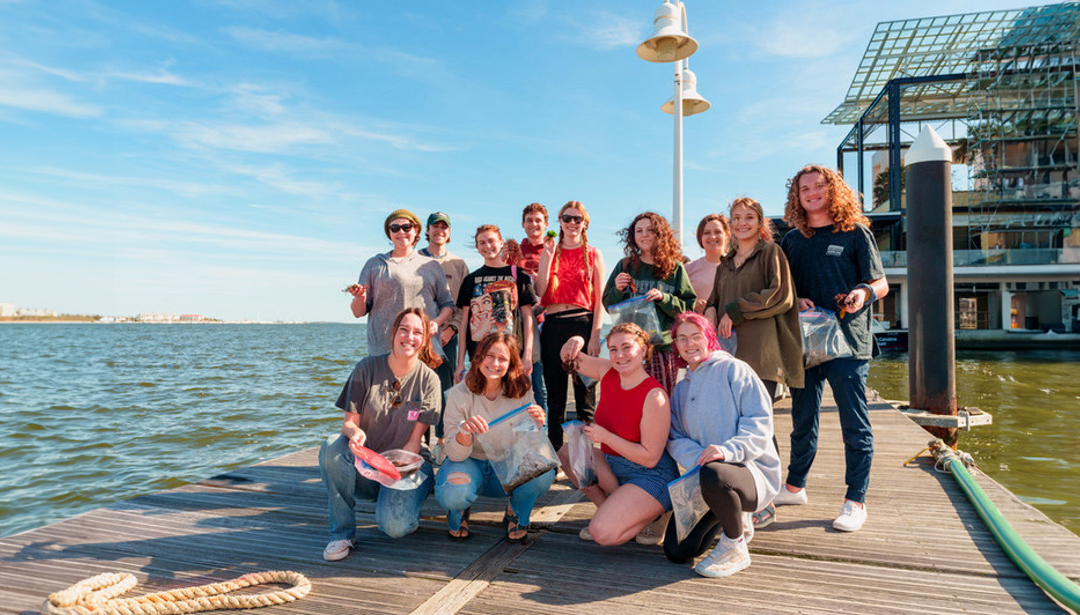Department of Biology
Engage in high-impact and immersive learning experiences in biology and marine biology led by renowned faculty, in state-of-the art facilities and in a world-class location: Charleston, SC.
We foster diversity by cultivating a welcoming and professional environment for individuals from all races, national origins, genders, sexual orientations, economic statuses, physical abilities, and personal religious practices.

Plant Physiology Lab
Our students engage in experiential learning in small class sizes.

Academic Programs
- Undergraduate Programs
- Dual Degree Programs
- Graduate Programs
-
Pre-Health
The College of Charleston offers excellent preparation for careers in the health professions and provides students with the opportunity to explore a wide range of career interests. In addition, they receive the preparation required to be competitive applicants to professional schools throughout the country.
The College of Charleston currently provides 2 Dual Degree programs in Nursing as well as a Dual Degree program in Pharmacy.
Please visit Health Professions Advising for further information.

Microbiology Lab
Many biology majors take courses preparing them for medical, dental and allied health programs.

Student Opportunities
-
Independent Study
The research options are a project between a research mentor and a student. Researchers can be CofC faculty, MUSC faculty, or staffers from organizations including South Carolina Department of Natural Resources, National Oceanic and Atomospheric Administration, and the USDA Vegetable laboratory. Biology students communicate their findings at the undergraduate research EXPO poster session on campus. Students have the opportunity to travel to conferences around the country to present their research.
-
Internships
Our students have internship opportunities with a variety of local organizations, including Birds of Prey, International Primate Protection League, Charleston Waterkeeper, SC Aquarium, Charlestowne Landing, and local veterinarians.
-
Study Abroad
Biology faculty are excited to provide study abroad programs for our students. Our current programs are in Little Cayman and Panama.
-
Campus Clubs
Biology students are very active in on-campus clubs including Biology Club, Women in STEM, Minorities in Medicine and Beta Beta Beta, the Biological Honors Society.
-
Scholarships
The Department of Biology has two scholarships available for incoming freshman.
About the Department of Biology
-
Meet our faculty
We have so many amazing faculty. This isn't a complete list, but a sampling of our faculty expertise includes:
- ecology.
- anatomy and physiology.
- molecular and cellular biology.
- genetics.
- biomechanics.
- neuroscience.
- biodiversity.
- computational biology.
Faculty work on microbes, plants and animals. They study in marine, coastal, terrestrial, tropical, temperate and arctic ecosystems.Because our faculty have such a wide range of research interests,students have so many exciting opportunities in class and beyond.
Biology has over thirty full-time faculty members with an additional number of adjunct faculty.
-
Facilities
Rita Hollings Science Center. Home to biology students. It's a modern instructional and research center with labs and instruction rooms.
Stono Preserve. The 950+ acre living laboratory includes a myriad of ecosystems including long-leaf pine forests, wetlands, savannahs, tidal marshes, as well as brackish, saltwater and fresh-water ponds
Grice Marine Laboratory. Supports teaching and research in evolutionary biology, marine biogeography, microbial ecology, phytoplankton ecology, environmental physiology, fish systematics and other marine sciences.
Take advantage of the proximity of the Medical University of South Carolina, South Carolina Department of Natural Resources and USDA Vegetable Laboratory.

Alumni Corner
Bryan Frazier ’00 (M.S. ’13) has done extensive research on sharks off the coast of South Carolina
Read Bryan's story here
